Social Exclusion, Power, and Video Game Play
Social Exclusion, Power, and Video Game Play
New Research in
Digital Media and Technology
Edited by David G. Embrick, J. Talmadge Wright, and Andras Lukacs
LEXINGTON BOOKS
Lanham Boulder New York Toronto Plymouth, UK
Published by Lexington Books
A wholly owned subsidiary of The Rowman & Littlefield Publishing Group, Inc.
4501 Forbes Boulevard, Suite 200, Lanham, Maryland 20706
www.lexingtonbooks.com
Estover Road, Plymouth PL6 7PY, United Kingdom
Copyright 2012 by Lexington Books
All rights reserved. No part of this book may be reproduced in any form or by any electronic or mechanical means, including information storage and retrieval systems, without written permission from the publisher, except by a reviewer who may quote passages in a review.
British Library Cataloguing in Publication Information Available
Library of Congress Cataloging-in-Publication Data
Social exclusion, power and video game play : new research in digital media and technology.
p. cm.
Includes bibliographical references and index.
ISBN 978-0-7391-3860-1 (hardback) ISBN 978-0-7391-3862-5 (ebook)
1. Video gamesSocial aspects. 2. Fantasy gamesSocial aspects. 3. Role playingSocial aspects. 4. LeisureSocial aspects. I. Embrick, David G. II. Wright, J. Talmadge. III. Lukcs, Andrs.
GV1469.34.S63S64 2012
794.8dc23
2011047269

The paper used in this publication meets the minimum requirements of American National Standard for Information Sciences Permanence of Paper for Printed Library Materials, ANSI/NISO Z39.48-1992.
Printed in the United States of America
To future critical sociologists and game researchers
Contents
Acknowledgments
Introduction
David G. Embrick, J. Talmadge Wright, and Andras Lukacs
Part I: Social-Psychological Implications of Virtual Play
| 1 | Marking the Territory: Grand Theft Auto IV as a Playground for Masculinity |
Elena Bertozzi
| 2 | Discursive Engagements in World of Warcraft : A Semiotic Analysis of Player Relationships |
Elizabeth Erkenbrack
| 3 | The Intermediate Ego: The Location of the Mind at Play |
Vanessa Long
| 4 | Producing Place and Play in Virtual Game Spaces |
J. Talmadge Wright
Part II: Social Inequalities in Video Game Spaces: Race, Gender, and Virtual Play
| 5 | Racism in Video Gaming: Connecting Extremist and Mainstream Expressions of White Supremacy |
Jessie Daniels and Nick LaLone
| 6 | Worlds of Whiteness: Race and Character Creation in Online Games |
David Dietrich
| 7 | Gendered Pleasures: The Wii, Embodiment and Technological Desire |
Adrienne L. Massanari
| 8 | Sincere Fictions of Whiteness in Virtual Worlds: How Fantasy Massively Multiplayer Online Games Perpetuate Color-blind, White Supremacist Ideology |
Joel Ritsema and Bhoomi K. Thakore
| 9 | The Goddess Paradox: Hyper-resonance Shaping Gender Experiences in MMORPGs |
Zek Cypress Valkyrie
Part III: Game Fans Speak Out
| 10 | World of Warcraft and the World of Science: Ludic Play in an Online Affinity Space |
Sean C. Duncan
| 11 | Cosmo-Play: Japanese Videogames and Western Gamers |
Mia Consalvo
| 12 | Beyond the Virtual Realm: Fallout Fans and the Troublesome Issue of Ownership in Videogame Fandom |
R. M. Milner
Conclusion: Apocalyptic Fantasies and Utopic Dreams UntoldWhere Do We Go from Here?
Andras Lukacs, David G. Embrick, and J. Talmadge Wright
Index
Acknowledgments
This book represents the collaborative efforts of many scholars from multi-disciplinary backgrounds, perspectives, and interests. As we noted in our previous book, Utopic Dreams and Apocalyptic Fantasies: Critical Approaches to Researching Video Game Play , we feel that there are very few collections out there like ours and it is only because of these researchers that we are able to put together this book. It has been our pleasure reading these papers and working with our contributors who are deeply energized about this field and their cutting edge research. Therefore, with much appreciation and fanfare, we would like to sincerely thank our contributors for giving us this opportunity to highlight such great work. From the bottom of our hearts, thank you for giving us the privilege to learn about your work. We would also like to acknowledge our friends and colleagues in the Sociology Department at Loyola University, Chicago, for their unwavering support, feedback, and tolerance as we explored the sociology of virtual realms and occasionally shared our experiences with (sometimes too much) overt enthusiasm. Most notably, our department chair, Rhys Williams, deserves special recognition for believing in us and in the merits of this project. Your support means a great deal to us and you are well appreciated. Thanks again to Toby Dye and the staff at Loyolas Institutional Review Board for continuing to work with us closely on human-subject issues and for being open to developing new methods of researching virtual play. Thanks also to Gary Alan Fine from Northwestern University, Bonnie Nardi and Tom Boellstroff from the University of California, Irvine, and Thomas Malaby from the University of Wisconsin, Milwaukee, for all of your invaluable feedback on this project. We would like to give a special round of thanks to the great folks at Lexington Books and our editors, Jana Hodges-Kluck and Michael Sisskin. Jana, you truly are one of a kind. We could not have asked for a more patient person to work with as we struggled with the book chapters, consent forms, and our own internal time management struggles. Thank you for your vision, patience, and editorial assistance. As we struggle to legitimate social science in virtual realms, we owe a great deal of gratitude to scholars from various subfields with the intellectual curiosity to learn about our work and help us keep analytical distance from our object of study. Finally, we would like to thank our loving families for always being there, no matter how much we lost ourselves in the virtual world.
Introduction
David G. Embrick, J. Talmadge Wright, and Andras Lukacs
the predicted global worth of the gaming market in 2011 will be close to $49 billion dollars with the highest growth rate taking place in the Asia-Pacific region. Within the umbrella category of video games, massive multi-player on-line role playing games (henceforth MMORPGs) have enabled players of all calibers to create and recreate real-time social experiences with other players in a wide variety of virtual environments that range from the most fantastical to spaces that replicate the real life environments of the players themselves. Beginning with early games like Ashrons Call, Ultima Online and Everquest , more recent games like World of Warcraft currently command over 11 million subscribers to their virtual landscape. And this is only the tip of the iceberg; MMORPGs are growing at a phenomenal rate as players are able to access such games in a wide variety of interfaces that include not only the personal computer, but also through entertainment consoles such as the Playstation 3, X-Box 360, and Nintendos Wii, and increasingly via smartphones (e.g., Motorola Android, Apple Iphone), smart tablets (e.g., Apple Ipad and Ipad2, Motorola Xoom, Samsung Galaxy), and cable television (e.g., Verizons FIOS, AT&Ts Uverse).

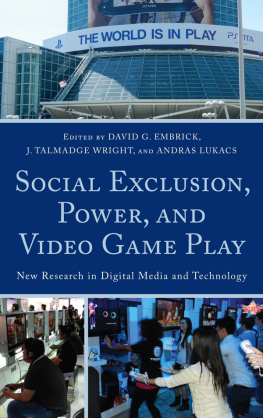
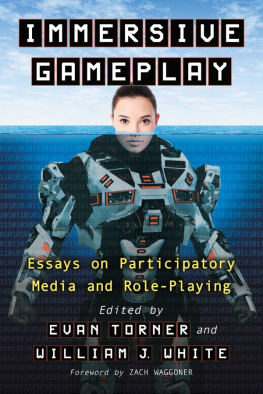

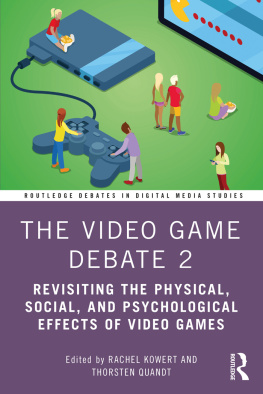
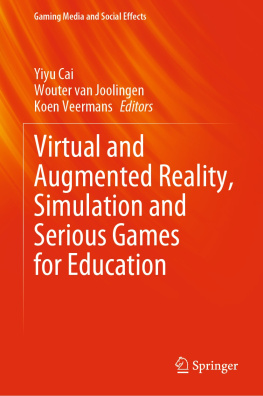

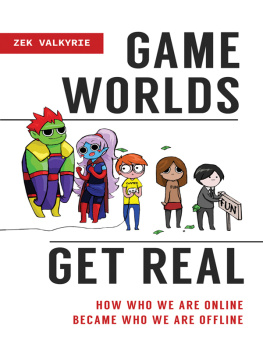
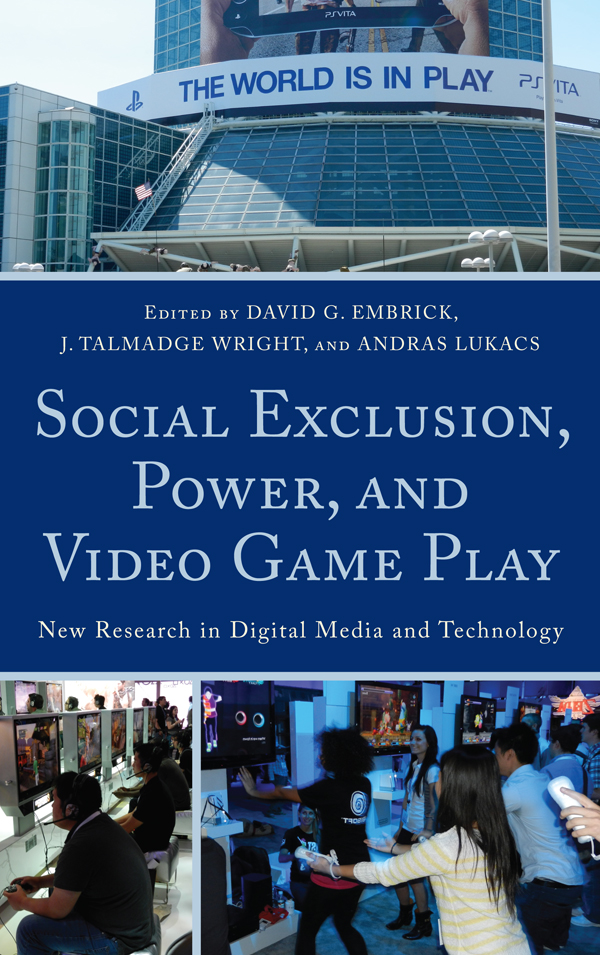
 The paper used in this publication meets the minimum requirements of American National Standard for Information Sciences Permanence of Paper for Printed Library Materials, ANSI/NISO Z39.48-1992.
The paper used in this publication meets the minimum requirements of American National Standard for Information Sciences Permanence of Paper for Printed Library Materials, ANSI/NISO Z39.48-1992.